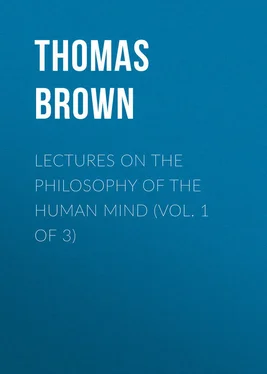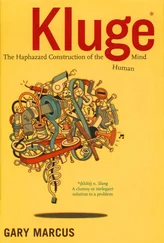Thomas Brown - Lectures on the Philosophy of the Human Mind (Vol. 1 of 3)
Здесь есть возможность читать онлайн «Thomas Brown - Lectures on the Philosophy of the Human Mind (Vol. 1 of 3)» — ознакомительный отрывок электронной книги совершенно бесплатно, а после прочтения отрывка купить полную версию. В некоторых случаях можно слушать аудио, скачать через торрент в формате fb2 и присутствует краткое содержание. Жанр: foreign_antique, foreign_prose, на английском языке. Описание произведения, (предисловие) а так же отзывы посетителей доступны на портале библиотеки ЛибКат.
- Название:Lectures on the Philosophy of the Human Mind (Vol. 1 of 3)
- Автор:
- Жанр:
- Год:неизвестен
- ISBN:нет данных
- Рейтинг книги:5 / 5. Голосов: 1
-
Избранное:Добавить в избранное
- Отзывы:
-
Ваша оценка:
- 100
- 1
- 2
- 3
- 4
- 5
Lectures on the Philosophy of the Human Mind (Vol. 1 of 3): краткое содержание, описание и аннотация
Предлагаем к чтению аннотацию, описание, краткое содержание или предисловие (зависит от того, что написал сам автор книги «Lectures on the Philosophy of the Human Mind (Vol. 1 of 3)»). Если вы не нашли необходимую информацию о книге — напишите в комментариях, мы постараемся отыскать её.
Lectures on the Philosophy of the Human Mind (Vol. 1 of 3) — читать онлайн ознакомительный отрывок
Ниже представлен текст книги, разбитый по страницам. Система сохранения места последней прочитанной страницы, позволяет с удобством читать онлайн бесплатно книгу «Lectures on the Philosophy of the Human Mind (Vol. 1 of 3)», без необходимости каждый раз заново искать на чём Вы остановились. Поставьте закладку, и сможете в любой момент перейти на страницу, на которой закончили чтение.
Интервал:
Закладка:
One very obvious distinction of the physical investigations of mind and matter, is, that, in intellectual science, the materials on which we operate, the instruments with which we operate, and the operating agent , are the same. It is the mind, endowed with the faculties of perception and judgment, observing, comparing, and classifying the phenomena of the mind. In the physics of matter, it is, indeed, the mind which observes, compares, and arranges; but the phenomena are those of a world, which, though connected with the mind by many wonderful relations of reciprocal agency, still exists independently of it – a world that presents its phenomena only in circumstances, over most of which we have no controul, and over others a controul that is partial and limited. The comparative facility, as to all external circumstances, attending the study of the mental phenomena, is unquestionably an advantage of no small moment. In every situation in which man can be placed, as long as his intellectual faculties are unimpaired, it is impossible that he should be deprived of opportunities of carrying on this intellectual study; because, in every situation in which he can be placed, he must still have with him that universe of thought, which is the true home and empire of the mind. No costly apparatus is requisite – no tedious waiting for seasons of observation. He has but to look within himself to find the elements which he has to put together, or the compounds which he has to analyze, and the instruments that are to perform the analysis or composition.
It was not, however, to point out to you the advantage which arises to the study of our mental frame, from the comparative facility as to the circumstances attending it, that I have led your attention to the difference, in this respect, of the physics of mind and matter. It was to show, – what is of much more importance, – how essential a right view of the science of mind is to every other science, even to those sciences, which superficial thinkers might conceive to have no connexion with it; and how vain it would be to expect, that any branch of the physics of mere matter could be cultivated to its highest degree of accuracy and perfection, without a due acquaintance with the nature of that intellectual medium, through which alone the phenomena of matter become visible to us, and of those intellectual instruments, by which the objects of every science, and of every science alike, are measured, and divided, and arranged. We might almost as well expect to form an accurate judgment, as to the figure, and distance, and colour of an object, at which we look through an optical glass, without paying any regard to the colour and refractory power of the line itself. The distinction of the sciences and arts, in the sense in which these words are commonly understood, is as just as it is familiar; but it may be truly said, that, in relation to our power of discovery, science is itself an art, or the result of an art. Whether, in this most beautiful of processes, we regard the mind as the instrument or the artist, it is equally that by which all the wonders of speculative, or practical knowledge, are evolved. It is an agent operating in the production of new results, and employing for this purpose the known laws of thought, in the same manner as, on other occasions, it employs the known laws of matter. The objects, to which it may apply itself, are indeed various, and, as such, give to the sciences their different names. But, though the objects vary, the observer and the instrument are continually the same. The limits of the powers of this mental instrument, are not the limits of its powers alone; they are also the only real limits, within which every science is comprehended. To the extent which it allows, all those sciences, physical or mathematical, and all the arts which depend on them, may be improved; but, beyond this point, it would be vain to expect them to pass; or rather, to speak more accurately, the very supposition of any progress beyond this point would imply the grossest absurdity; since human science can be nothing more than the result of the direction of human faculties to particular objects. To the astronomer, the faculty by which he calculates the disturbing forces that operate on a satellite of Jupiter, in its revolution round its primary planet, is as much an instrument of his art, as the telescope by which he distinguishes that almost invisible orb; and it is as important, and surely as interesting, to know the real power of the intellectual instrument, which he uses, not for calculations of this kind only, but for all the speculative and moral purposes of life, as it can be to know the exact power of that subordinate instrument, which he uses only for his occasional survey of the heavens.
To the philosophy of mind, then, every speculation, in every science, may be said to have relation as to a common centre. The knowledge of the quality of matter, in the whole wide range of physics, is not itself a phenomenon of matter, more than the knowledge of any of our intellectual or moral affections; it is truly, in all its stages of conjecture, comparison, doubt, belief, a phenomenon of mind; or, in other words, it is only the mind itself existing in a certain state. The inanimate bodies around us might, indeed, exhibit the same changes as at present, though no mind had been created. But science is not the existence of these inanimate bodies; it is the principle of thought itself variously modified by them, which, as it exists in certain states, constitutes that knowledge which we term Astronomy ; in certain other states, that knowledge which we term Chemistry ; in other states our Physiology, corporeal or mental, and all the other divisions and subdivisions of science. It would surely be absurd to suppose, that the mixture of acids and alkalies constitutes Chemistry , or that Astronomy is formed by the revolution of planets round a sun. Such phenomena, the mere objects of science, are only the occasions on which Astronomy and Chemistry arise in the mind of the inquirer, Man. It is the mind which perceives bodies, which reasons on their apparent relations, which joins them in thought as similar, however distant they may be in sphere, or separates them in thought as dissimilar, though apparently contiguous. These perceptions, reasonings, and classifications of the mind must, of course be regulated by the laws of mind, which mingle in their joint result with the laws of matter. It is the object indeed which affects the mind when sentient; but it is the original susceptibility of the mind itself, which determines and modifies the particular affection, very nearly, if I may illustrate what is mental by so coarse an image, as the impression which a seal leaves on melted wax depends, not on the qualities of the wax alone, or of the seal alone, but on the softness of the one, and the form of the other. Change the external object which affects the mind in any case, and we all know, that the affection of the mind will be different. It would not be less so, if, without any change of object, there could be a change in the mere feeling, whatever it might be, which would result from that different susceptibility becoming instantly as different, as if not the mind had been altered, but the object which it perceived. There is no physical science, therefore, in which the laws of mind are not to be considered together with the laws of matter; and a change in either set of laws would equally produce a change in the nature of the science itself.
If, to take one of the simplest of examples, the mind had been formed susceptible of all the modifications which it admits at present, with the single exception of those which it receives on the presence of light, of how many objects and powers in nature, which we are now capable of distinguishing, must we have remained in absolute ignorance! But would this comparative ignorance of many objects be the only effect of such a change of the laws of mind, as I have supposed? Or rather, is it not equally certain, that this simple change alone would be sufficient to alter the very nature of the limited science of which the mind would still be capable, as much as it narrowed its extent? Science is the classification of relations; varying, too, in every case, as the relations observed are different; and how very differently should we, in such circumstances, have classed the few powers of the few objects, which might still have become known to us, since we could no longer have classed them according to any of those visual relations, which are always the most obvious and prominent. It is even, perhaps, an extravagant supposition, that a race of the blind, unless endowed with some other sense to compensate the defect of sight, could have acquired so much command of the common arts of life, or so much science of any sort, as to preserve themselves in existence. But though all this, by a very strong license of supposition , were taken for granted, it must surely be admitted, that the knowledge which man could in those circumstances acquire, would be not merely less in degree, but would be as truly different from that which his powers at present have reached, as if the objects of his science, or the laws which regulate them, had themselves been changed to an extent, at least as great as the supposed change in the laws of mind. The astronomy of the blind, if the word might still be used to express a science so very different from the present, would, in truth, be a sort of chemistry . Day and night, the magnificent and harmonious revolution of season after season, would be nothing more than periodical changes of temperature in the objects around; and that great Dispenser of the seasons, the Source of light, and beauty, and almost of animation, at whose approach nature seems not merely to awake, but to rise again, as it was at first, from the darkness of its original chaos, if its separate existence could be at all inferred, would probably be classed as something similar, though inferior in power, to that unknown source of heat, which, by a perilous and almost unknown process, was fearfully piled and kindled on the household hearth.
Читать дальшеИнтервал:
Закладка:
Похожие книги на «Lectures on the Philosophy of the Human Mind (Vol. 1 of 3)»
Представляем Вашему вниманию похожие книги на «Lectures on the Philosophy of the Human Mind (Vol. 1 of 3)» списком для выбора. Мы отобрали схожую по названию и смыслу литературу в надежде предоставить читателям больше вариантов отыскать новые, интересные, ещё непрочитанные произведения.
Обсуждение, отзывы о книге «Lectures on the Philosophy of the Human Mind (Vol. 1 of 3)» и просто собственные мнения читателей. Оставьте ваши комментарии, напишите, что Вы думаете о произведении, его смысле или главных героях. Укажите что конкретно понравилось, а что нет, и почему Вы так считаете.












![Anne Blunt - A Pilgrimage to Nejd, the Cradle of the Arab Race. Vol. 1 [of 2]](/books/749489/anne-blunt-a-pilgrimage-to-nejd-the-cradle-of-the-thumb.webp)